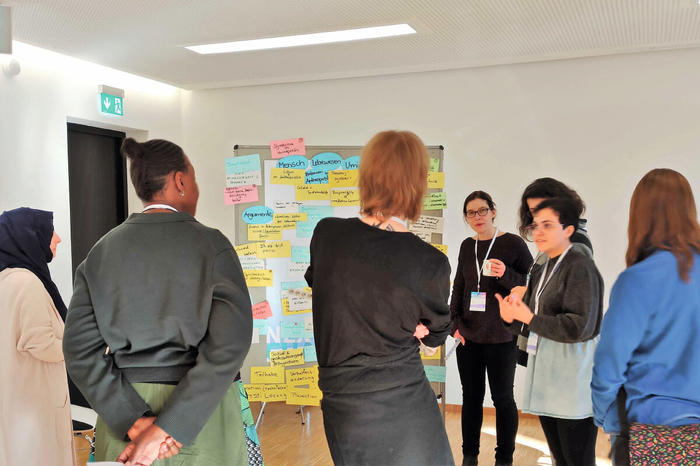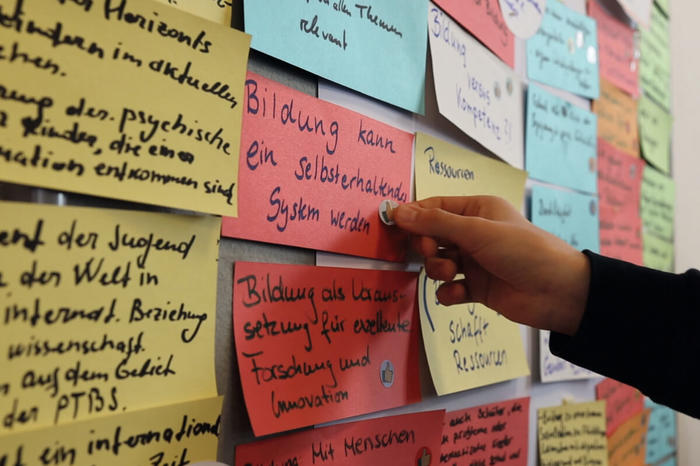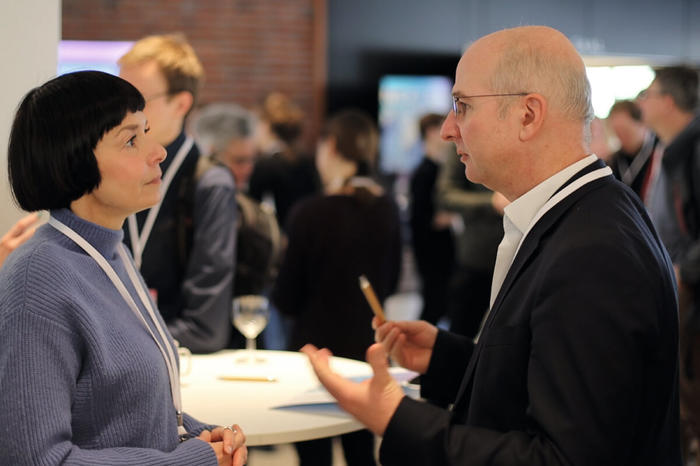Valuable Sources of Knowledge from Society – How Civil Society Stakeholders become Partners in the Epistemological Process in BUA Research Projects
Discussion – an important element of transdisciplinary exchange Image credit: FREIHEIT Gruppe Interdisziplinäre Medienproduktion GmbH
Image Credit: Image credit: FREIHEIT Gruppe Interdisziplinäre Medienproduktion GmbH
Current studies on participation in research and BUA-funded projects such as "Beyond Social Cohesion – Global Repertoires of Living Together" show that in new forms of knowledge production and dissemination, people become partners in the epistemological process. The BUA has therefore found the topic for the Next Grand Challenge in a participatory process.
Click here to go directly to the Next Grand Challenge!
To the press release of the Next Grand Challenge
Whoever wants to create knowledge, can no longer just work in laboratories or libraries. Other knowledge resources – for example from professional practice or the wealth of experience of civil society – are necessary to conduct excellent research. In numerous projects of the Berlin University Alliance with its partner institutions Freie Universität Berlin, Humboldt-Universität zu Berlin, Technische Universität Berlin, and Charité – Universitätsmedizin Berlin, science and society mutually benefit from processes of so-called "transdisciplinary research": complex issues are viewed and analyzed from vastly different perspectives and stakeholders who are sometimes neglected in societal decision-making and design processes are given a voice. Surprising solutions often emerge in the joint learning process.
The Berlin University Alliance funds transdisciplinary research projects, such as the project "Social cohesion, food and health. Inclusive food system transitions". Here, excellent scientists and scholars, supported by civil society stakeholders, are investigating, among other things, initiatives to build regional value chains, with great success. The associated conferences naturally bring together stakeholders from academia, business, politics, and civil society.
In order to promote transdisciplinarity, i.e. exchange across the boundaries of disciplines and science, the Berlin University Alliance also brought academics and public figures such as Prof. Dr. Christian Drosten from Charité – Universitätsmedizin Berlin or Chris Patten, Chancellor of the University of Oxford and former EU Commissioner as well as ARD London correspondent Annette Dittert into conversation as part of the Oxford Berlin Research Partnership. At a symposium at the Berlin-Brandenburg Academy of Sciences and Humanities in 2022, they discussed how complex issues can be communicated on the Internet in times of hate speech. In addition, the BUA has set up its own competence centers to promote exchange across disciplinary and scientific boundaries, even away from prominent podiums:
The Expertise and Knowledge Exchange Office (KnEx) teaches in workshops and lectures how multilateral knowledge exchange can also succeed on an institutional level. The Research Forums strengthen transdisciplinary research by testing new methods of transdisciplinary research in innovative formats. And in the experimental science communication laboratories, research groups use elements of the theater or gaming to develop new exchange formats for target groups that have been poorly covered so far, their goal being to develop science communication that not only carries knowledge to society but also concerns from society to science. This is necessary in a rapidly changing society in order to find scientifically sound and socially accepted solutions to global challenges. For the Berlin University Alliance, it was therefore clear that individuals and groups from civil society should be involved in the selection and implementation of the next inter- and transdisciplinary research program, the Next Grand Challenge.

Joint Research for a Liveable Future – How the Berlin University Alliance is making Civil Society a Stakeholder in the Next Grand Challenge
Weighted together: The topic of the Next Grand Challenge
Image Credit: FREIHEIT Gruppe Interdisziplinäre Medienproduktion GmbH
What do substitutes for plastic look like? How can we find ways out of the biodiversity crisis? And what can a building material made of fungi do? The inhabitants of Berlin have many ideas for excellent future research in the Berlin research hub. In the participation process for the Next Grand Challenge, the best one was determined.
"Your topic for Berlin's top-level research": Under this motto, the Berlin University Alliance called on civil society in July 2022 to participate in the selection of the Next Grand Challenge, the next major research program of the university alliance. And many responded to the call: Around 370 pupils, students, researchers, and stakeholders from business, politics, administration, and civil society worked out a total of 43 topic proposals in idea camps and workshops. In order to concretize and evaluate the topics, the BUA then invited all participants as well as other stakeholders from civil society, business, administration, and politics, a total of almost 140 people, to the Next Grand Challenge Forum. The enthusiasm of young people for science, a vibrant atmosphere full of networking and exchange, was palpable there. And so the participatory process for selecting the Next Grand Challenge at the BUA is considered a great success, because the suggestions of pupils and students brought scholars and scientists valuable new perspectives on their own research.
The result of the Next Grand Challenge Forum: five strong topic proposals for final selection in the Board of Directors, the governing body of the Berlin University Alliance, finally "Responsible Innovation in Times of Transformation". The research topic of the Next Grand Challenge of the Berlin University Alliance describes one of the central tasks of science for the coming years: finding solutions for sustainable technical and resilient social innovations for a future worth living in the face of human-induced climate change, in the age of the Anthropocene. And because scientific solutions have a greater chance of being implemented if they are created together with those affected, with stakeholders from civil society, the scientists will not work alone on the Next Grand Challenge but will incorporate knowledge and experience from civil society in order to actually create "Responsible Innovation in Times of Transformation". In this way, citizens, NGOs, and the Berlin administrations will be actively involved in the research process. In addition, the BUA partners have strong research partnerships with research institutions not affiliated with academia that are prominent in the Berlin research community, such as the Leibniz Association, the Max Planck Society, the Helmholtz Association and the Fraunhofer Society. They are all focused on helping the Next Grand Challenge succeed and on networking to jointly find answers to the major global challenges of the Anthropocene – supported by experts from the Berlin University Alliance and its integrated research environment. Experts such as Prof. Dr.-Ing. Christine Ahrend, a specialist in integrated transport planning, has long been involved in citizen participation and explains in an interview how participation in science can succeed.
"It makes a big difference whether a student contributes their perspective on a topic or a professor"
Discussion – an important element of transdisciplinary exchange
Image Credit: FREIHEIT Gruppe Interdisziplinäre Medienproduktion GmbH
Prof. Dr.-Ing. Christine Ahrend heads the Chair of Integrated Transport Planning at Technische Universität Berlin. As an expert in transdisciplinary research, she contributes her knowledge to the BUA's Steering Committee for "Knowledge Exchange" to promote the mutual exchange of knowledge from the sciences and various sectors of society. Together with the BUA team of the objectives "Focusing on Grand Challenges" and "Fostering Knowledge Exchange", the concept for the participatory topic identification for the Next Grand Challenge has been developed.
Prof. Ahrend, we observe that the number of participation formats between science and civil society is growing. Why is civil society knowledge important for research?
The collaboration between society and science is referred to as a transdisciplinary research mode. We have achieved an enormous depth of expertise in the scientific disciplines but this expertise alone is not enough to address the pressing challenges of our time, such as climate change, digitalization or global health. These challenges additionally require concrete practical and operational knowledge to enable societal change. This is where transdisciplinary research comes in. It enables both scientific knowledge gain and implementation-oriented problem solving by bringing scientific and social stakeholders together. They identify the epistemological problem, formulate research questions, and agree on how to work together to arrive at new insights and concrete solutions. Transdisciplinarity is therefore more than the selective participation of citizens in research projects, it is a new understanding of how to deal with knowledge and make decisions.
What happens when science meets Berlin's urban society?
We were able to observe this well in the topic identification process of the Next Grand Challenge. It makes a big difference whether a student contributes their perspective on a topic or a professor who has been researching in their discipline for decades. The knowledge of the two is based on different previous experiences, which makes one no less valuable than the other. Research should not be isolated from urban society in an ivory tower. It should actively include other perspectives. We have received feedback from many civil society stakeholders about how happy they are to be heard on a level playing field and to contribute their perspectives alongside real scholars and scientists. Many scholars and scientists, in turn, found the perspectives of social stakeholders enriching. Both sides benefit from this exchange.
Participation is not a matter of course. How do you get people to participate?
Often already, by basically acknowledging and welcoming the relevance of their perspective. Many people wonder to what extent they can contribute anything of value at all. It is important to show people the value of their practical experience in the field and why they can have an impact on future research. Many are happy to hear this, especially young people who feel that they are not heard enough by the older generation. That is why the youth participation process of the Next Grand Challenge was so important, because it allowed us to give young people the opportunity to have their voices heard as equals in a direct exchange with scholars and scientists. For other people, for example from organized civil society, it is also about making new contacts, for example for future projects or the like. In principle, the following always applies in any participation process: Barriers to participation must be kept low. That is why, for example, we have paid young people an expense allowance, as is also customary in other participation processes. So, young people with part-time jobs do not have to suffer financially from sacrificing their free time and then not being able to work on that day.
When is transdisciplinary research successful?
Transdisciplinary research is successful when the result of collaboration between urban society and scholars and scientists means that knowledge from urban society also has a real impact on research and thus on solving today's problems. Participation only for the sake of participation does not advance us as a society, as the stakeholders involved are frustrated that they have invested their time but do not feel a direct impact. That is why it is so important to keep explaining the benefits of mutual exchange to everyone involved. And then to follow up the new experiences with real action.



